Let’s agree, first, on one thing. A gala that opens a symphony orchestra’s season should feel like a gala. Should be fun and lively, with some glamour and glitz.
But to create a gala like that, you have to do some planning. And — for their gala last Sunday — it seemed like the National Symphony didn’t do that.
Their problems
First, the board chair. She come onstage after the first piece on the program, and the air went out of the show.
Nothing against her — maybe she’s a fine board chair. But she’s not a public speaker. And apart from some brief good news about fundraising, she had nothing much to say. Just generalities about how wonderful everything was.
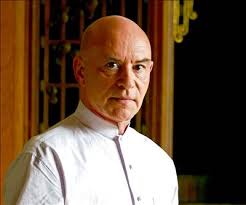 And while she spoke, the orchestra’s music director, Christoph Eschembach, stood on stage with her. Doing nothing! He looked like a lost soul. Didn’t speak, wasn’t spoken to. Embarrassing.
And while she spoke, the orchestra’s music director, Christoph Eschembach, stood on stage with her. Doing nothing! He looked like a lost soul. Didn’t speak, wasn’t spoken to. Embarrassing.
Some of the musicians, meanwhile, had left the stage to make room for a piano to be brought on. While the board chair spoke, they filed back in. Distracting.
Problem two
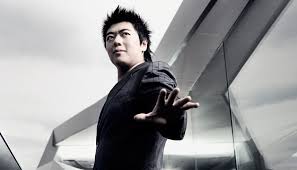 The piano was brought on so Lang Lang could play a concerto. Which should have been festive. Lang Lang!
The piano was brought on so Lang Lang could play a concerto. Which should have been festive. Lang Lang!
But no. The concerto was the Rachmaninoff First. Which doesn’t have much appeal. Not even Lang Lang could make it shine. He got warm but not very long applause. I’m not sure he would have been brought back on stage for another bow, if he hadn’t come out on his own.
So why this piece? Because, I’m told, it’s what Lang Lang is playing this year. (Big soloists have that power, to tell orchestras what they’ll play.)
Which puts the NSO in a bind. They want the shiny name for their gala. But then he decides to play music without much shine. Which brings the gala down.
So I think they should have said no. “Lang Lang, we love you. And in the middle of the season, the first concerto, sure. But we can’t have it on our gala!”
Problem three
In recent years, the NSO has had the nice idea of dividing their galas in two parts. The first half is classical, and then after intermission they turn the show into a pops concert. Festive! And their pops conductor, Steven Reineke, speaks well from the stage.
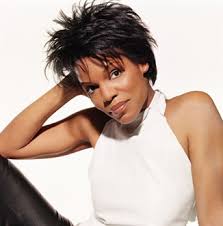 This year, they wanted to honor the biggest cultural event this fall in DC, the opening of the National Museum of African-American History and Culture. So the pops part of the program was all black music. Featuring Nnenna Freelon, a jazz singer, Take 6, the famous vocal group, and Brian McKnight, a big R&B star.
This year, they wanted to honor the biggest cultural event this fall in DC, the opening of the National Museum of African-American History and Culture. So the pops part of the program was all black music. Featuring Nnenna Freelon, a jazz singer, Take 6, the famous vocal group, and Brian McKnight, a big R&B star.
All these people are stage animals. They light up the hall, not just when they sing, but also when they speak.
And that made the board chair — and in fact the whole classical half of the program — seem even more drab. Bad planning. If you know your second half is going to be hot, up your game in the first half.
Problem four
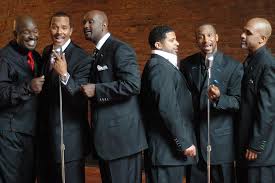 Take 6 was badly miced. Worse than badly. Intolerably miced. They ought to sound easy and fun. Instead, they came off as boomy, crude, and overbearing.
Take 6 was badly miced. Worse than badly. Intolerably miced. They ought to sound easy and fun. Instead, they came off as boomy, crude, and overbearing.
They’ve been singing professionally since 1988. doing show after show (and winning 10 Grammys). How to mic them isn’t an unknown art. If the NSO couldn’t figure out how to do it, that’s really bad planning. Unacceptably bad.
Problem 5
The orchestra didn’t play the second half well. Nor did they play particularly well in the first half, but that’s a different problem, a problem of their overall quality.
The problem in the second half was rehearsal. They had fewer rehearsals, from what I’ve heard, than they’d have for one of their main orchestral concerts.
And that, if it’s true, was a mistake. The charts they played — the orchestral accompaniments to the songs the singers did — fell flat. Neither the sound, nor the shape, nor the rhythm came through.
And the arrangements were intricate. They were greatly varied. Each had its own sound, its own flow, its own rhythm. The musicians hadn’t played them before. And, stylistically, this music doesn’t play to their strengths, even if they do a lot of pops. Their home base is classical music.
So if they really had fewer rehearsals, that hurt them.
Why all this matters
Because, first, they should want their gala to pop. It didn’t.
And, second, because classical music is having problems with its appeal and its audience. Which means you have to ramp up your game. Make your performances vivid events. You may not know how to do that, maybe because classical concerts are so ritualized. But in 2016, when you need a new audience, you have to learn many new things. To judge from the gala, the NSO hasn’t yet gotten that memo.
Some smaller points.
First: the three vocal acts are different from each other, and cried out for different treatment on stage. Take 6 is perfect in a concert hall. But Nnenna Freelon (though she’s a fine concert singer) might do best in a club. And Brian McKnight’s home base is R&B radio, soft, dark, and sexy.
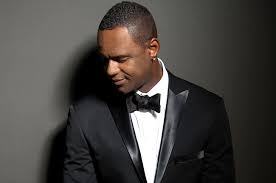 So it would have been fun — and made the show livelier — to present each act differently. Not much could be done with the space on stage, because the orchestra filled most of it. But they could have varied the lighting. Or at least — the most natural thing in the world — dimmed the lights for Brian McKnight.
So it would have been fun — and made the show livelier — to present each act differently. Not much could be done with the space on stage, because the orchestra filled most of it. But they could have varied the lighting. Or at least — the most natural thing in the world — dimmed the lights for Brian McKnight.
And second…
Take 6 has another gig coming up in the DC area, and so they did something that came naturally to them. They told us about it, and invited us to come.
So why didn’t the orchestra do that? During the first half, why didn’t they tell us some highlights of the new season? And especially what they’d be playing next, what their next concert will be.
Maybe someone thinks that’s undignified, that the orchestra would lower itself, if it advertised on stage.
But I think that’s wrong. What matters isn’t the orchestra’s dignity; instead it’s the audience. If the people at the gala like the NSO — and the orchestra should hope that they do — then they want to know what’s going on. They want to know what the orchestra will play, what the music’s going to be.
So why not treat them like friends, and tell them?

Good points, well said!
The Rachmaninoff First Piano Concerto is a magnificent score with a first movement that boasts a sweeping melody characteristic of its composer. It was also — according to my teacher Ozan Marsh, who studied with Rachmaninoff — the composer’s favorite among his concertos.
A missed opportunity. Unfortunate.
I wonder if the orchestra management would recognise that now?
Or would they say “This is the way we do things here”?